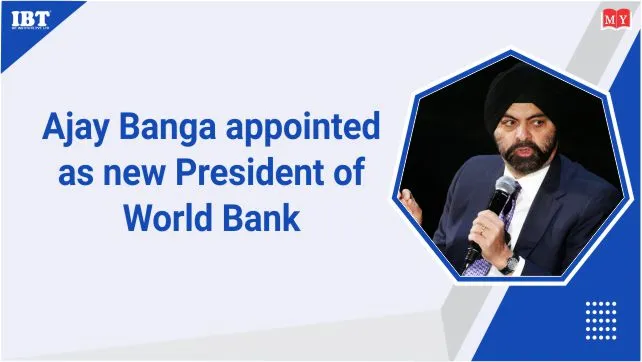
Ajay Banga appointed as new President of World Bank
Ajay Banga, the former CEO of Mastercard will be the next President of the World Bank, replacing former Chief, David Malpass. Banga was the only contender nominated by the US President Joe Biden in February to lead the bank which has historically been led by an American. He began his career with Nestle, became head of Citi's Asia Pacific operations and later served as CEO of Mastercard. He is currently Vice Chairman at General Atlantic, a private equity company. Banga is expected to start the new job in early June.
About Ajay Banga:
Banga was born to army officer Harbhajan Singh Banga, who retired as a lieutenant-general of the Indian army. He is part of India's prestigious St Stephen’s College where he studied economics and completed his further education at the famed Indian Institute of Management, Ahmedabad.
He began his career with Nestle in India and went on to work with Citigroup in India and Malaysia. Banga had a very successful career with Mastercard where he served as the CEO and reportedly drew a whooping salary of Rs 5.2 million per day. Currently, Banga serves as Vice Chairman at General Atlantic, a private equity company.
Banga is a co-founder of The Cyber Readiness Institute, Vice Chair of the Economic Club of New York and served as a member of President Barack Obama's Commission on Enhancing National Cybersecurity. He is a past member of the US President's Advisory Committee for Trade Policy and Negotiations.
Banga also featured in Fortune's list of the World's Leading Businesspersons and received the Leadership Award from the Business Council for International Understanding.
In 2016, the Indian government awarded Banga with a Padma Shri, the fourth highest civilian honour.
About World Bank:
The World Bank is an international financial institution that provides loans and grants to the governments of low- and middle-income countries for the purpose of pursuing capital projects. The World Bank is the collective name for the International Bank for Reconstruction and Development (IBRD) and International Development Association (IDA), two of five international organizations owned by the World Bank Group. It was established along with the International Monetary Fund at the 1944 Bretton Woods Conference. After a slow start, its first loan was to France in 1947. In the 1970s, it focused on loans to developing world countries, shifting away from that mission in the 1980s. For the last 30 years, it has included NGOs and environmental groups in its loan portfolio. Its loan strategy is influenced by the United Nations' Sustainable Development Goals, as well as environmental and social safeguards.
As of 2022, the World Bank is run by a president and 25 executive directors, as well as 29 various vice presidents. IBRD and IDA have 189 and 174 member countries, respectively. The U.S., Japan, China, Germany and the U.K. have the most voting power. The bank aims loans at developing countries to help reduce poverty. The bank is engaged in several global partnerships and initiatives, and takes a role in working toward addressing climate change. The World Bank operates a number of training wings and it works with the Clean Air Initiative and the UN Development Business. It works within the Open Data Initiative and hosts an Open Knowledge Repository.
The World Bank has been criticized as promoting inflation and harming economic development, causing protests in 1988 and 2000. There has also been criticism of the bank's governance and response to the COVID-19 pandemic.
 4.5/5
4.5/5








